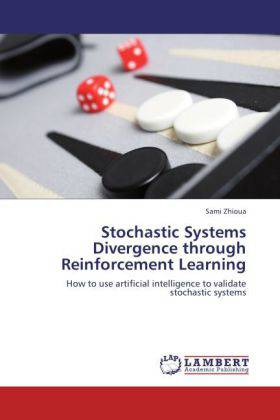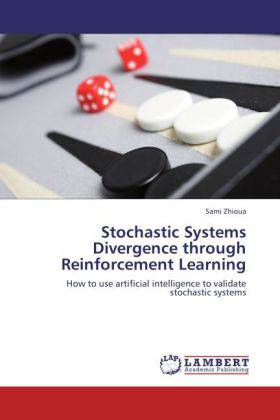
Door een staking bij bpost kan je online bestelling op dit moment iets langer onderweg zijn dan voorzien. Dringend iets nodig? Onze winkels ontvangen jou met open armen!
- Afhalen na 1 uur in een winkel met voorraad
- Gratis thuislevering in België vanaf € 30
- Ruim aanbod met 7 miljoen producten
Door een staking bij bpost kan je online bestelling op dit moment iets langer onderweg zijn dan voorzien. Dringend iets nodig? Onze winkels ontvangen jou met open armen!
- Afhalen na 1 uur in een winkel met voorraad
- Gratis thuislevering in België vanaf € 30
- Ruim aanbod met 7 miljoen producten
Zoeken
Stochastic Systems Divergence through Reinforcement Learning
How to use artificial intelligence to validate stochastic systems
Sami Zhioua
Paperback | Engels
€ 67,45
+ 134 punten
Omschrijving
Modelling real-life systems and phenomena using mathematical based formalisms is ubiquitous in science and engineering. The reason is that mathematics offer a suitable framework to carry out formal and rigorous analysis of these systems. For instance, in software engineering, formal methods are among the most efficient tools to identify flaws in software. The behavior of many real-life systems is inherently stochastic which require stochastic models such as labelled Markov processes (LMPs), Markov decision processes (MDPs), predictive state representations (PSRs), etc. This thesis is about quantifying the difference between stochastic systems. The important point of the thesis is that reinforcement learning (RL), a branch of artificial intelligence particularly efficient in presence of uncertainty, can be used to quantify efficiently the divergence between stochastic systems. The key idea is to define an MDP out of the systems to be compared and then to interpret the optimal value of the MDP as the divergence between them. The most appealing feature of the proposed approach is that it does not rely on the knowledge of the internal structure of the systems.
Specificaties
Betrokkenen
- Auteur(s):
- Uitgeverij:
Inhoud
- Aantal bladzijden:
- 164
- Taal:
- Engels
Eigenschappen
- Productcode (EAN):
- 9783847339717
- Verschijningsdatum:
- 3/02/2012
- Uitvoering:
- Paperback
- Formaat:
- Trade paperback (VS)
- Afmetingen:
- 152 mm x 229 mm
- Gewicht:
- 249 g

Alleen bij Standaard Boekhandel
+ 134 punten op je klantenkaart van Standaard Boekhandel
Beoordelingen
We publiceren alleen reviews die voldoen aan de voorwaarden voor reviews. Bekijk onze voorwaarden voor reviews.











